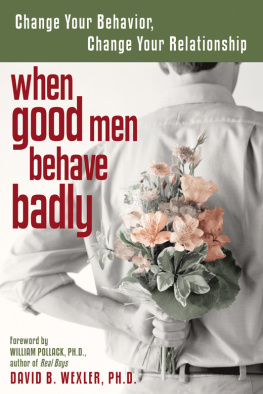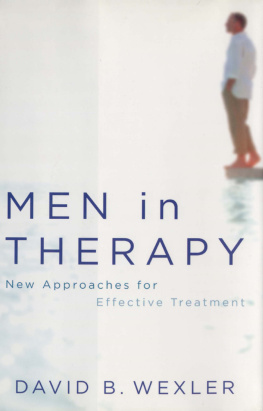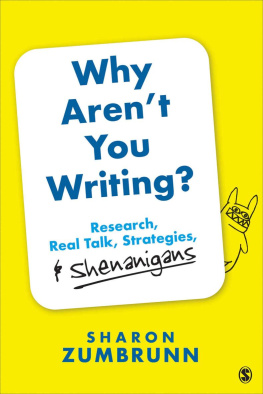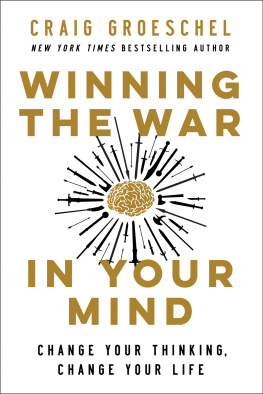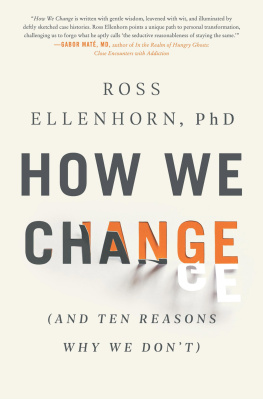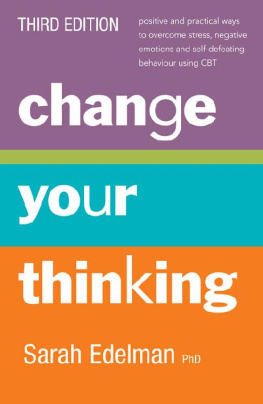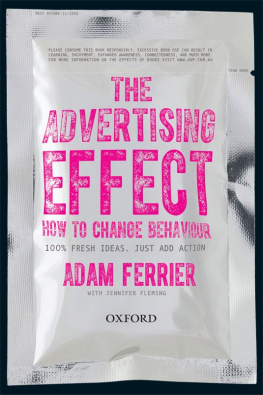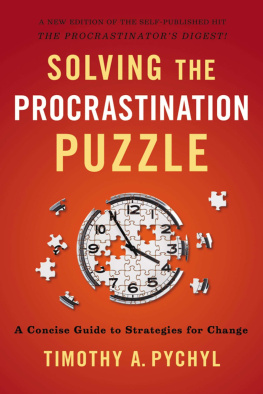
David Wexler, Ph.D., is the founder and executive director of the Relationship Training Institute in San Diego, an organization designed to help relationships in conflict. You may contact him and find out more about him and his work at www.RTIprojects.com.
The California Psychological Association has honored Dr. Wexler with the Distinguished Contribution to Psychology award. He is also the author of several books, including Domestic Violence 2000 and The Adolescent Self.
Dr. Wexler lives in San Diego with his wife and two teenage children.
David Wexler adroitly addresses a central problem in male-female relationships, namely the male propensity for emotional withdrawal, sarcasm, humiliation, intimidation, emotional blow-ups, and infidelity. Wonderfully empathic with mens experiences, When Good Men Behave Badly helps men who do not wish to behave badly develop the needed emotional skills. This book will open mens minds and hearts to a very different way to approach male-female relationships.
Ronald F. Levant, Ed.D., ABPP, Co-Editor, A New Psychology of Men

Publishers Note
This publication is designed to provide accurate and authoritative information in regard to the subject matter covered. It is sold with the understanding that the publisher is not engaged in rendering psychological, financial, legal, or other professional services. If expert assistance or counseling is needed, the services of a competent professional should be sought.
Excerpts from Affliction by Russell Banks, copyright 1989 by Russell Banks. Reprinted by permission of HarperCollins Publishers Inc.
Excerpts from Continental Drift by Russell Banks, copyright 1985 by Russell Banks. Reprinted by permission of HarperCollins Publishers Inc.
Excerpts from High Fidelity by Nick Hornby, copyright 1995 by Nick Hornby. Used by permission of Riverhead Books, an imprint of Penguin Group (USA) Inc.
Excerpts from I Know This Much Is True by Wally Lamb, copyright 1998 by Wally Lamb. Reprinted by permission of HarperCollins Publishers Inc.
Excerpts from The Great Santini by Pat Conroy, copyright 1976 by Pat Conroy. Reprinted by permission of Houghton Mifflin Company. All rights reserved.
Distributed in Canada by Raincoast Books.
Copyright 2004 by David B. Wexler
New Harbinger Publications, Inc.
5674 Shattuck Avenue
Oakland, CA 94609
Cover design by Amy Shoup
Edited by Jessica Beebe
Text design by Tracy Marie Carlson
ISBN 1-57224-346-5 Paperback
All Rights Reserved
Printed in the United States of America
New Harbinger Publications Web site address: www.newharbinger.com
epub ISBN: 9781608827190
To the future: my daughter, Juliana, and my son, Joseph
Contents
Foreword
Real men, what David Wexler calls in this important new book good men, are not self-sufficient, narcissistic lone rangers who care for nothing other than satisfying their own needs. Research, clinical study, and personal experience reveal that the vast majority of men are yearning for meaningful, mutual, and lasting connection, but, too often, their inner fears push them to lose these opportunities for genuine relationship or to go astray. If we want more men to become empathic to themselves and others, we must first become empathic to mens emotional pain, in a manner that neither excuses the responsibility for certain bad action, nor vilifies a man who is struggling to come out of the emotional coldback into the fold of human connection and kindnessafter he slips from grace.
When Good Men Behave Badly strikes exactly the correct balance between understanding mens issues with relationships in psychological depth and providing clear and pragmatic behavioral suggestions for improving their capacity for intimacy. It utilizes many mens proclivity for action plans, rather than just words, in a positive and productive manner, by giving them and their loved ones creative strategies for how to improve how men think, feel, and behave in the midst of a relationship. The book neither excuses the common faults or bad acts that basically decent men may fall prey to, nor castigates men, many of whom are struggling with inner demons from their long forgotten pasts. Such struggles can lead to the hurtful behavior in intimate partnerships which, in turn, unwittingly causes relational painnot only for these mens loved ones, but for the men themselves.
David Wexler takes us on a journey back to mens boyhood, when so many were forced into rigid models of masculine behavior that required stoic independence, the avoidance of showing the world their emotional pain, and the need to keep their normal human vulnerability a secret from both their closest loved ones and themselves; all this in order to create and maintain the false facade of a real boy or real man. The emotional straitjackets into which many of todays good men were forced as boys were accompanied by a healthy dose of shame, directed toward those who dared to be different. Shame came through teasing and public humiliation; it was deeply embedded and threatened the heart of their self-esteem. Sadly, many boys today are still forced into those same emotional straitjackets. Can we be surprised then that these good men may often behave badly in the midst of an intimate relationship of genuine sharing? While such emotional connections are genuinely and deeply longed for, they remain, in the depths of many mens souls, a frightening threat to their false sense of bravado, their masks of masculinity, which could at any moment break down, revealing their human vulnerability, and leaving them to feel shamefully unmanly.
What a conundrum for the good men amongst us, and for the other men, women, and children who love them and whom they do their best to love. Yet have no fear, for Wexlers When Good Men Behave Badly provides practical solutions for mens relationship problems! Better than that, this book bases its action programs for behavior change on years of solid research and clinical experience that is brought to the reader in jargon-free, but intelligent, user-friendly nuggets that have been so sorely missing in the fields of relationship advice and understanding of mens development over the past decades.
Although this is a book meant to help men become all that they can be, written in male-affirmative, guy-friendly language, it is also a volume respectful to women, filled with numbers of useful suggestions to help them to better understand what really makes the men in their life tick, to recognize what is beneath the surface, and to offer opportunities to help the men in their lives make the relationship-enhancing changes theyve been struggling to achieve for so long a time. Wexlers book works equally well when a mans intimate partner is another man, and helps all men who will read it and take it to heart to rediscover the validation that true connections bring, not only with the other intimate adults in their lives, but also with their sons and daughtersour next generationwith whose healthy development we, as adults, are entrusted.
When Good Men Behave Badly goes beyond fad and fashion to opportunities for meaningful behavioral change in relationships, encompasses state-of-the-art dynamic research while remaining a good read, and moves from poignant real-life stories to practical suggestions that will yield results. Its the closest thing to having a relationship expert by your side.

